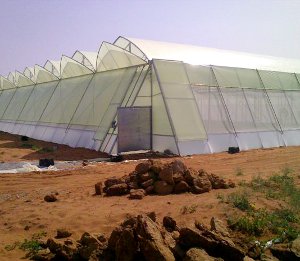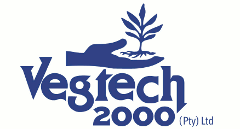From rags to riches with greenhouse technology
Community agriculture projects and smallholder farmers in Africa can benefit tremendously from utilising greenhouse technology.

Greenhouses protect crops from too much heat or cold, shield plants from dust storms and blizzards, and help to keep out pests.
This has been demonstrated at the Tshwaraganang community project in the isolated town of Windsorton, situated in South Africa’s Northern Cape Province.
The project was initiated by the provincial government, who commissioned a feasibility study for a greenhouse production unit in the area. After the study was completed, a tender was put out for the construction of the greenhouse infrastructure. The tender was won by Vegtech 2000 – a South African company, with over sixteen years’ experience in greenhouse projects, growing, construction and accessory supply – and by 2006 work was completed on the 3,600 m2 greenhouse.
After a rocky start, Agribusiness in Sustainable Natural African Plant Product (ASNAPP), a NGO with offices in a number of countries across the continent, in 2008 was called in to develop a business plan and provide training to the local farmers. This was the effective birth of Tshwaraganang Hydroponics, a hydroponics project involving the “soil-free” cultivation of cucumbers, tomatoes and brinjals.
ASNAPP secured a deal to supply cucumbers to Freshmark, a subsidiary of pan-African supermarket group Shoprite and responsible for the retailer’s fruit and vegetable procurement and distribution. Freshmark in Bloemfontein signed a supply agreement with Tshwaraganang, having formally registered the project as one of its permanent supply sources. This provided Tshwaraganang Hydroponics with a ready market for its produce.
This project has been a great success. In February 2010, in less than 18 months since selling commenced, Tshwaraganang Hydroponics crossed the R1 million sales mark. This was a significant achievement for a community that until the project started had virtually no income.
Freshmark is now set to open up its pepper and tomato supply chains to Tshwaraganang. A modern packhouse facility is also currently under construction and there are plans to expand the greenhouse production base to at least a hectare.
Vegtech’s Alex Hofmeyr believes there is tremendous scope for similar greenhouse projects in other parts of the continent, especially in areas that are too dry or too wet for open field cultivation. “Greenhouses is the way in which agriculture is moving. It allows farmers to produce better quality crops with fewer inputs such as water and chemicals,” explains Hofmeyr.
Vegtech 2000 – a partner in greenhouse farming
Farmers, business people and government organisations in Africa have the opportunity to invest in profitable greenhouse agriculture with Vegtech as trusted business partner. The company has completed more than 300 projects across the continent.
Vegtech is able to provide its clients with complete solutions for greenhouse agriculture, from access to financing through to the design and construction.
“Firstly we would visit the client and discuss their requirements and needs. Vegtech would then examine the climatic conditions at the proposed site. After that, the system would be designed with the right kind of ventilation and irrigation systems,” says Hofmeyr.
Once the system is designed, Vegtech would finalise all the documentation and export the greenhouse anywhere in Africa. The company can also send a team to build the project from scratch.
Hofmeyr notes that greenhouses are most suitable for the cultivation of higher value crops that utilise the space in the greenhouse effectively. These include tomatoes, peppers and cucumbers as well as melons and herbs. Many of these crops are also in high demand across the continent.
Another popular use for greenhouses in Africa is for the production of cut flowers, which can be exported to Europe. Hofmeyr says that a number of companies have already invested in cut flower production in Africa.
Contact details

For more information about running a successful greenhouse farming business, please contact Alex Hofmeyr, Vegtech 2000 sales manager, at:
Email: alex@vegtech.co.za
Website: www.vegtech.co.za

Quantum Binary Signals
ReplyDeleteProfessional trading signals delivered to your mobile phone every day.
Follow our trades right now and earn up to 270% a day.